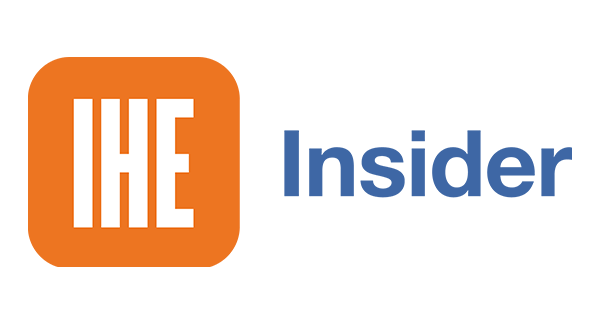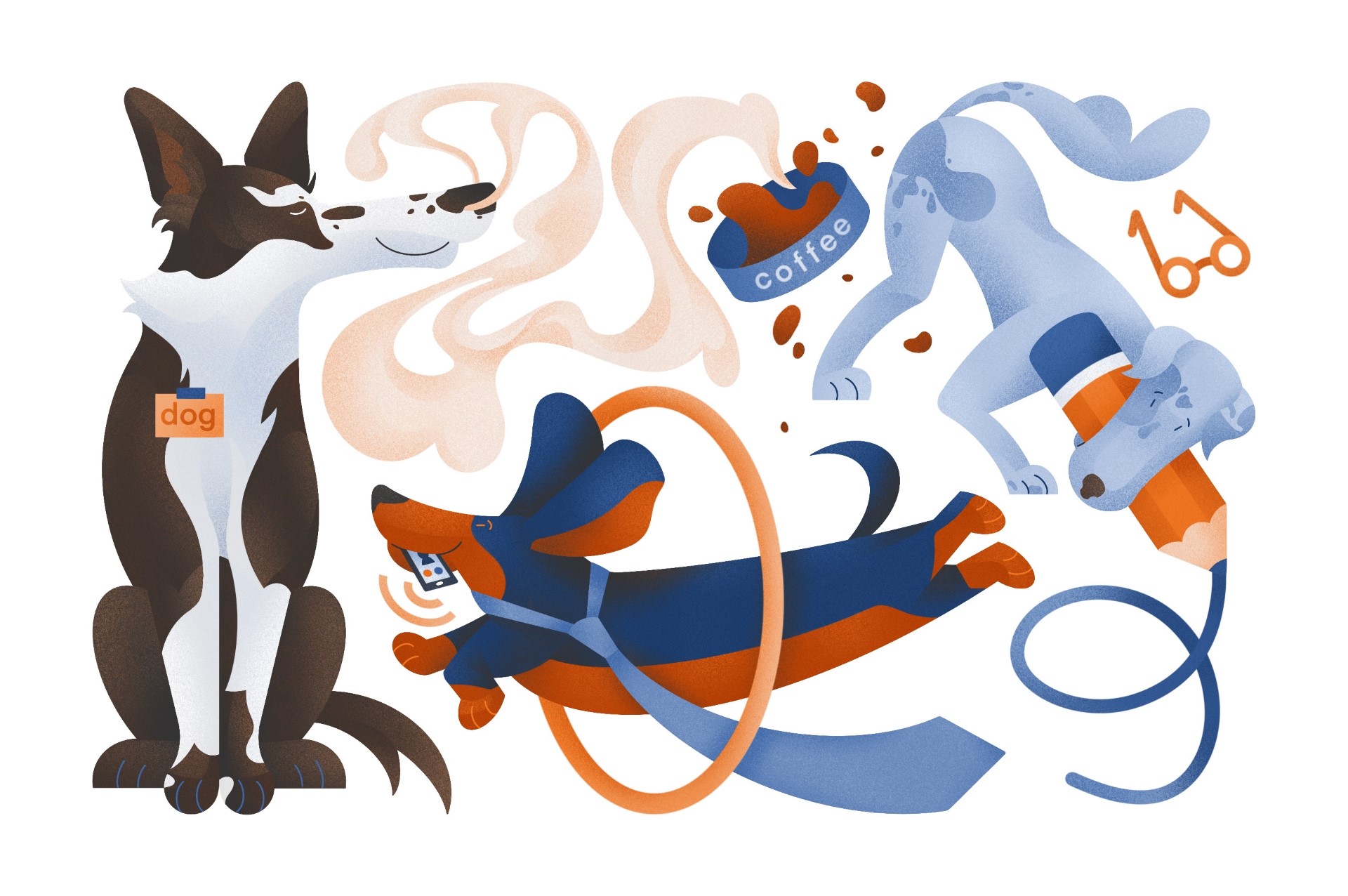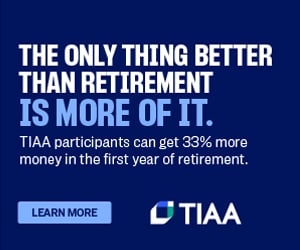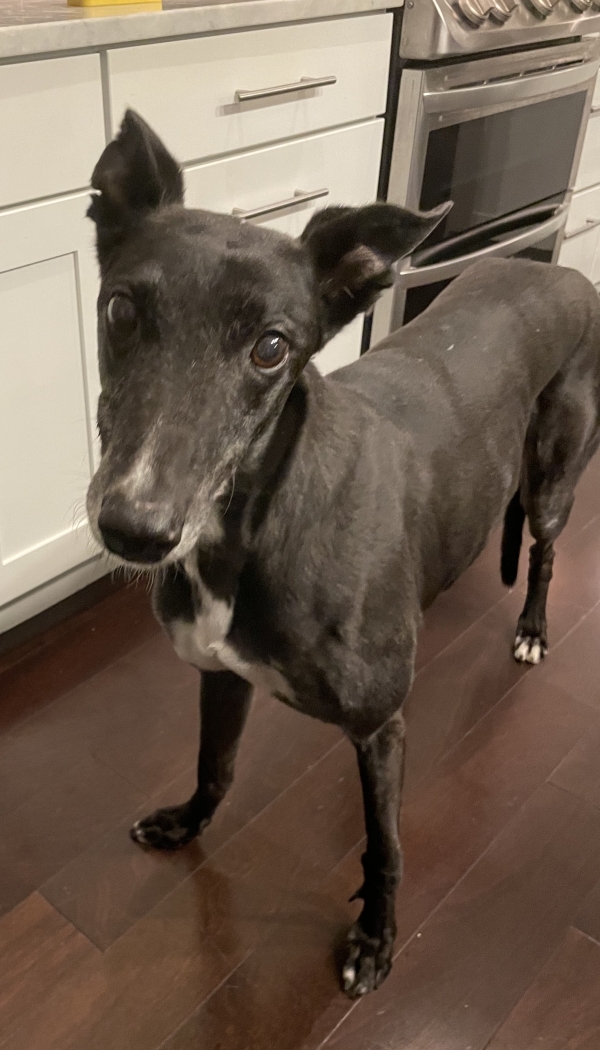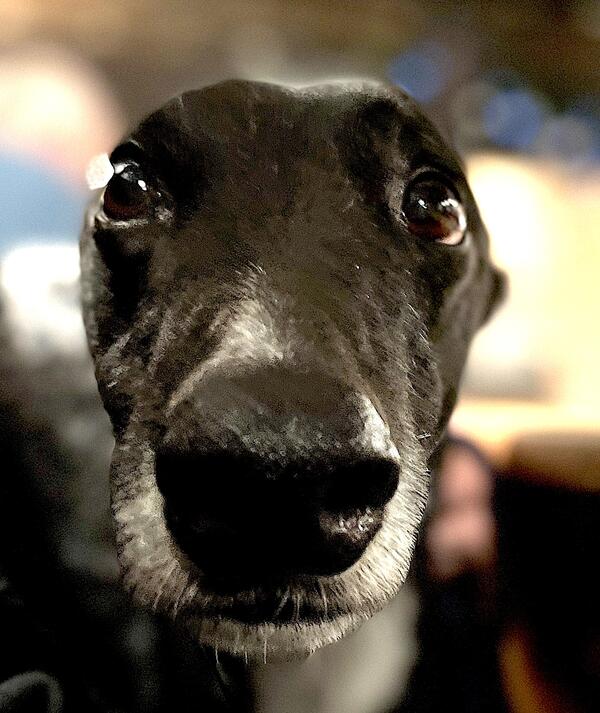From Rachel Toor
It’s bad form to joke about someone who suffered a serious heart issue being, you know, mort, but our readers know that Doug Lederman is alive, well, and enjoying his time as a lady who lunches already up to his elbows in exciting new work.
Doug and Scott Jaschik created a shift in higher ed media when they left the stately, plump Chronicle of Higher Education to found a young, scrappy, and hungry start-up, Inside Higher Ed.
We dare not forget today that we are the heirs of that first revolution. Now let the word go forth from this time and place, to friend and foe alike, that the torch has been passed to a new generation.
Please allow me to introduce y’all to our editor in chief: an American—an Okie!—with an unusual global perspective, Sara Custer.
She took some time away from what is perhaps one of the strangest and busiest times covering the news so I could fire questions at her.
First and most important, what breed of dog are you?
Sandy from Annie—a lovable mutt. Loyal. Lucky. Kind to orphans.
I was thinking toy poodle. Tell readers a little about your background, starting with how your time as a Future Farmer of America set you up to take on this role.
By all accounts I’m a failed FFA kid; I’m neither a farmer nor have I lived in America for the past 18 years. But growing up in 4-H and FFA gave me a strong work ethic and a can-do attitude. Being from a small town in Oklahoma shaped my worldview and gave me an understanding of working-class rural people that can get lost in one-dimensional stereotypes. Most kids in my high school didn’t go to college, and if they did, they didn’t graduate.
Of course, I appreciated none of Oklahoma rural life when I was growing up. I couldn’t wait to get out of there and go to the big city. Which I did, first to Chicago to attend Loyola University. When I graduated, I moved to Barcelona to teach English and fell in with an expat crowd that was producing an alternative weekly magazine. After a few years, I went to London to get a master’s in international journalism.
Back to the FFA influence, I think I have a high tolerance for general gross stuff. Shoveling cow manure from the age of 5 will do that to you. I’m waiting to see how that will come in handy in this role.
Shoveling shit is a big part of an editor’s job. How did your career prepare you to lead IHE?
I started out at The PIE News, reporting on international education all over the world. Then I moved to Times Higher Education, where I was digital editor, launching newsletters, taking over the podcast and editing blogs. I then launched Campus, a new section of THE where educators and administrators from around the world write advice and opinion pieces.
One of the things that has impressed folks who have met you is that you know U.S. higher education and you also bring a boatload of global knowledge.
Most people in higher ed have some sort of international connection—either from living abroad, coming from immigrant families, or spending time overseas. At a minimum it helps grease the wheels when I’m making small talk. Reporting on international student mobility and learning about academic research showed me how much foreign tuition fees prop up U.S. institutions.
And even though they’re less international than their European or British peers, American colleges are still competing for talent globally. Being aware of how geopolitics impacts U.S. higher ed’s place on the global stage will be very important for the next four years.
What has surprised you since you started last March, other than the fact that Doug nearly died?
Uff, don’t remind me. That was a truly terrifying time last summer. In addition to being scared we were going to lose Doug, suddenly not having him there meant a lot of things fell into my lap, like speaking commitments and making what felt like big editorial decisions. It would’ve been nice of him to leave me some handover notes before nearly dying. Sheesh.
I’ve been surprised by how committed our reporters and editors are to their work. Several of them have told me that working at Inside Higher Ed is their dream job—and it shows! They’re passionate about the sector, they believe in what higher education is and they have developed an expertise of their beats. I’ve made some big changes to the team structure and the types of stories we write, and they’ve rolled with it. It’s a fun newsroom to work in.
I also didn’t expect to hear so much from our readers. We get emails all the time, mostly from people telling us they think we’ve done something wrong, but it shows they care enough to engage. I appreciate that.
So it’s okay that I’m giving out your email here so people can tell you what they think about The Sandbox and that Harry is cuter than Neville?
Sure. And Harry may be cuter, but Nev is more seductive. [Ed’s note: Don’t think so, but see for yourselves, below.]
Which higher ed issues are you most interested in (even though I know that as editor you’re going to say everything and you have no favorites because your job is to uncover the Truth)?
You’re right, it’s all of them. But one issue I wish we would talk about more is higher education’s role in addressing the climate crisis. It’s a no-brainer that universities and colleges should be front and center in this work. There isn’t one part of their mission that isn’t affected by climate change, but it rarely comes up in any conversations or appears on any conference agendas. And sadly, when we report on these stories, the audience numbers are paltry.
I’m also interested in seeing how the foundations of higher ed—shared governance and tenure—might start to crumble, voluntarily or otherwise, under increasing pressure to adapt and respond to the pace of change. I’m talking mostly about AI here and how institutions have to start incorporating it into the curriculum.
But other innovative shifts like the makeup of degrees or the number of credit hours in them could require faculty and leaders to make quicker decisions than the current system really allows for or encourages.
What kinds of changes or tweaks do you see making at IHE?
IHE is No. 1 for higher ed news. That’s always been our strength, and we will continue to have news at the heart of what we do. But there’s also stuff you miss when you’re reporting on developments incrementally. I want to challenge our reporters to take a deeper look at the issues to help our readers connect the dots in a way a news story can’t. So look out for some more long-form journalism from us.
I also want to find ways to serve the next generation of our readers. Many of them are working in a sector that’s totally different to [Ed’s note: we’re not in London anymore, Dorothy—here we say “different from”] the one from 20 years ago and have totally different media consumption habits.
How do we get the overworked financial aid administrator with three small kids and no free time to give us some of her limited attention? What does the new generation of presidents need from us and in what format? [Ed’s note: hint hint—tell Sara what you want to see from our Insiders program].
Hey, have you read the 600-page science fiction novel I sent you yet? I mean, it’s been about two weeks.
I’ve been a little distracted lately, but I will get to it. I was riveted by Red Mars, so I have high expectations for this one. I’ll blame you if I don’t like it.
Go ahead and blame me. Great leadership, Sara. So other than deep dives into literature, what keeps the editor of IHE up at night, other than pesky Sandbox editors texting them nonstop?
With any leadership transition, there’s always going to be change, and that’s the case for IHE. We’ve got a really talented roster of reporters in our newsroom at the moment, so I’m not worried about our ability to continue to do great journalism. But it will be different from how IHE has done it until now, and notably without the voices of Doug and Scott, so I hope we’re able to bring readers along with us as we turn the page.
It’s also a difficult time for media companies at the moment. I’d love to while away the days gossiping news gathering, but part of my job is also making sure the editorial team is supporting the business side of things as much as we can.
Some other questions that have taken up residence in my brain: How much change will the Trump administration impose on higher ed? How damaging will it be? How helpful could it be? How can universities and colleges bridge the education divide in our society? What are we going to do about the 40 million some-college-but-no-degree folks?
And, y’know, also stuff like: Shit, I forgot to answer that email or Was I too harsh in my feedback to that editor?
You mean me, right?
Was it that obvious?
As I said, people who have met you are impressed by your smarts and savvy. But they also say, “She’s a delight” and “sweet.” Often we hear this from older women. (Not it!) Do you think you might face some of the sexism women presidents tell me still exists in the academy?
Undoubtedly. I think it’s compounded by the fact that I’m younger than my counterparts and most leaders in higher ed.
Let me ask you this, Rachel: Would I still be a toy poodle if I were a man?
Oh, snap! Don’t worry, buttercup. You will age like the rest of us mortals. Speaking of which, it’s particularly difficult to take over from a founder. Do you find that a challenge at all, or have the past 11 months and 2 days been a breeze?
I’ll credit the team at IHE for welcoming me with mostly open arms. I haven’t run into many “well, Doug/Scott did it this way, so we have to keep doing it that way” mentalities.
What has been a challenge is adapting our workflows and division of labor to fit a business that doesn’t have two editors/founders who work 18 hours a day. And figuring out what I want to do with this role rather than just slotting into the mold they left.
What do you want people to know about you personally?
I’m funnier than Rachel.
That is your most annoying quality. For the record, I would never call you sweet.
Well if you ask my husband, Kash (and I just did), he’d say sometimes I have no chill. As in, I can be impatient or take things/myself too seriously. I’d say I can be quite stubborn and stick to my guns when a bit of flexibility could be better. I’m a Taurus, though, so that’s expected. I’m also a millennial, which means I talk about my Zodiac sign.
And yet, you’ve shown yourself to be delightfully open and not at all defensive when called on the carpet gently questioned by divaesque newsletter creators.
Insider friends, make sure you get an opportunity to meet our sweet Sara when or wherever you can. Stop by the office when you’re in D.C. or ask her to meet for coffee at a conference.
And text or email me when you hear her give a great talk (as others have been doing) so I can pass along the praise. As you all know, it never hurts to get a secondhand compliment when you’re doing a new and really, really, really hard job.
Speaking of which, since everyone's brains are exploding, we're going to provide a little treat for our Insiders: a short, snappy weekly rundown of the things you don't want to hear about need to know to keep on top of the stream of doodoo coming out of the White House. “The First 100 Days,” written by our news editor, Katherine Knott (who may be funnier than both me and Sara and pretty much lives and breathes federal policy, processes, and people), will be in your inboxes soon.
